Strategic Leadership and Organizational Performance Analysis
VerifiedAdded on 2023/01/04
|18
|5626
|39
Report
AI Summary
This report provides a comprehensive analysis of strategic leadership, exploring its definition, importance, and various approaches within the context of the Sahara Group, a multinational energy and infrastructure conglomerate. The report delves into the role of leaders in strategic development, emphasizing their involvement, interest, and monitoring responsibilities. It examines the values and ethics of leadership in driving consumer social responsibility and sustainability, highlighting the importance of customer interest, employment generation, and enhanced living standards. The report also defines the role of leaders in driving organizational performance, focusing on team monitoring, employee guidance, and performance management. Furthermore, it explores leadership power and influence, the development of leadership for competitive advantages, and criteria for measuring strategic effectiveness. Finally, the report discusses the significance of teams and team leadership, differentiating between workgroup teams and leadership, comparing formal and informal groups, and analyzing group and team development stages, all with a focus on enhancing organizational performance and achieving sustainable business practices.

Paraphrase This Document
Need a fresh take? Get an instant paraphrase of this document with our AI Paraphraser
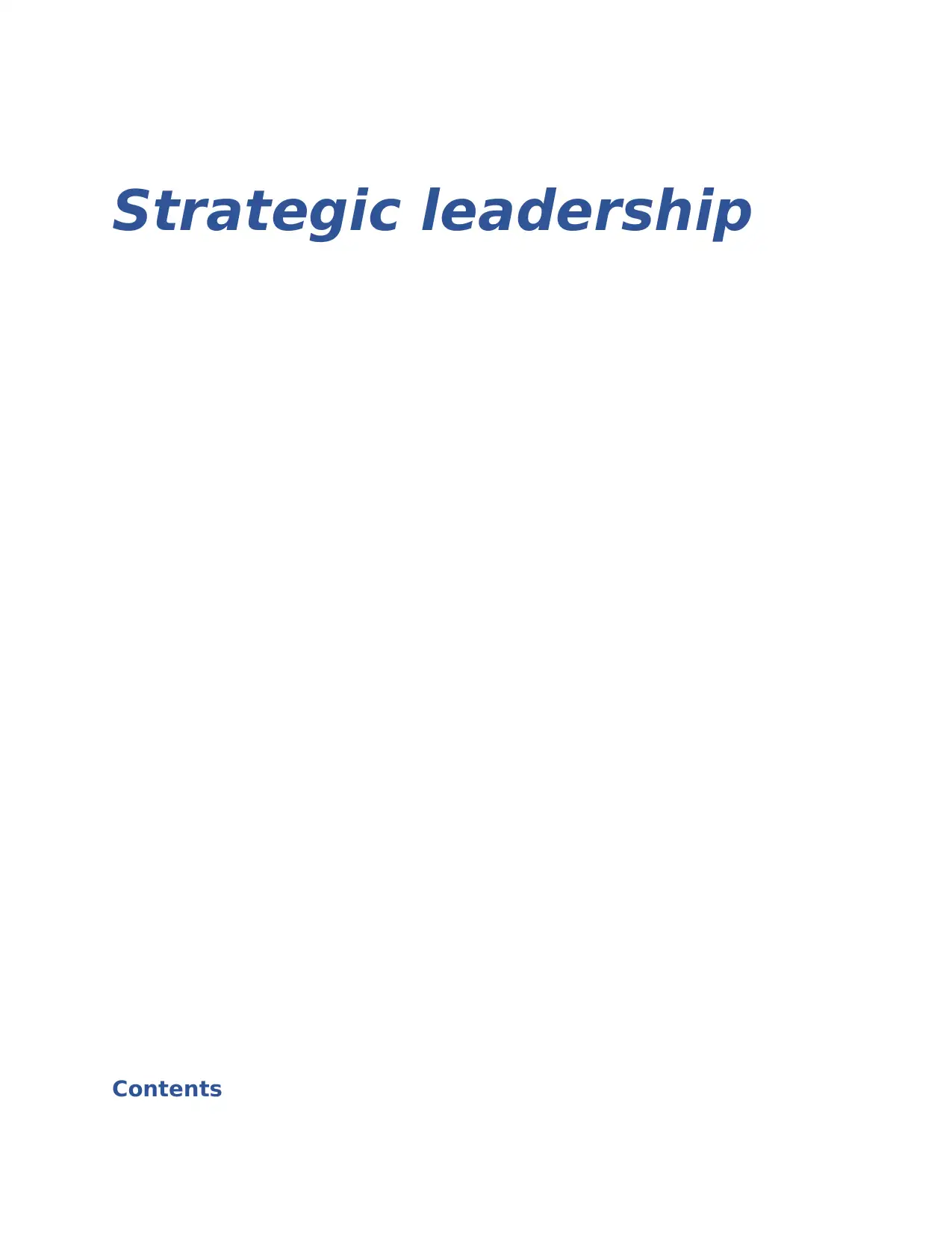
Strategic leadership
Contents
Contents
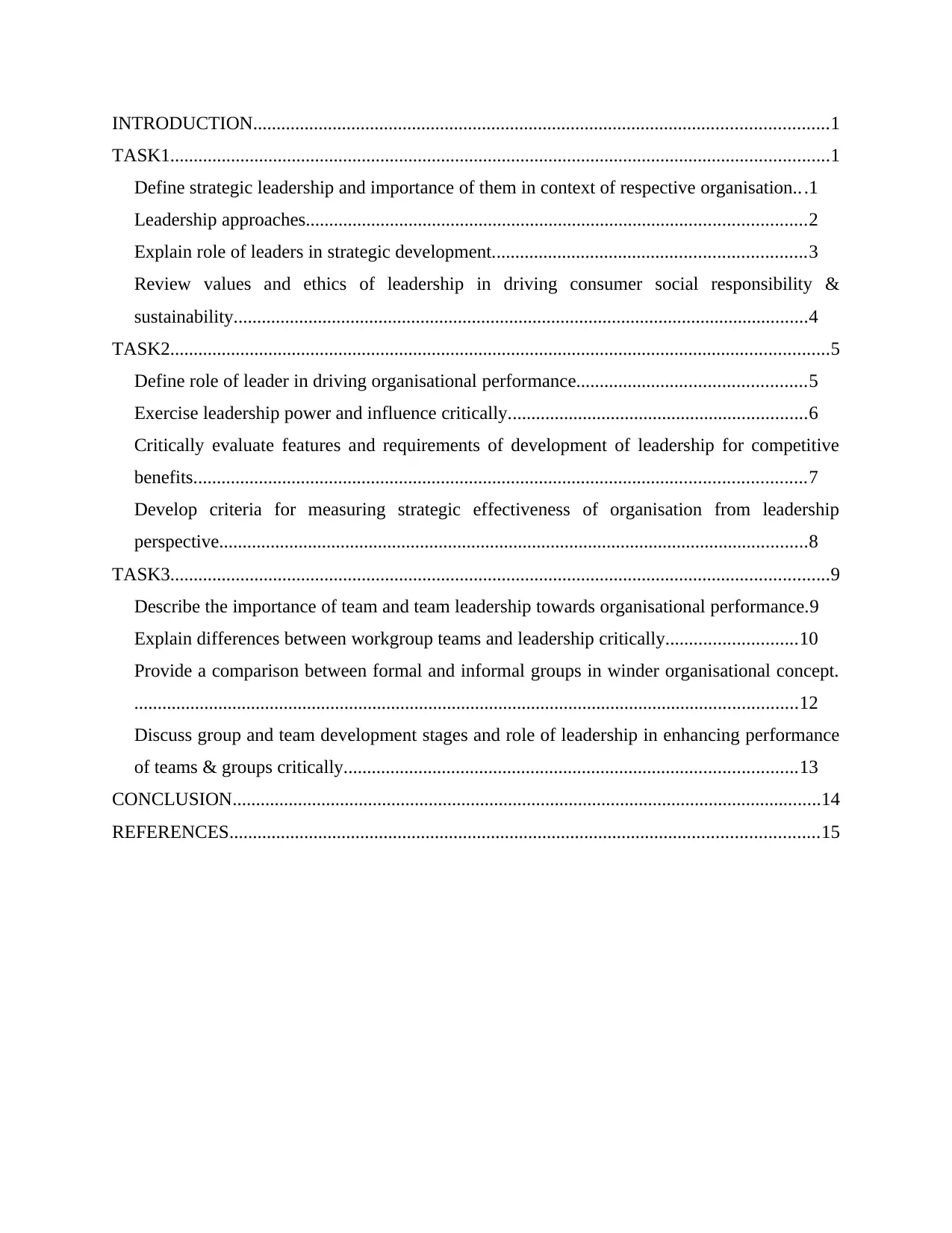
INTRODUCTION...........................................................................................................................1
TASK1.............................................................................................................................................1
Define strategic leadership and importance of them in context of respective organisation...1
Leadership approaches...........................................................................................................2
Explain role of leaders in strategic development...................................................................3
Review values and ethics of leadership in driving consumer social responsibility &
sustainability...........................................................................................................................4
TASK2.............................................................................................................................................5
Define role of leader in driving organisational performance.................................................5
Exercise leadership power and influence critically................................................................6
Critically evaluate features and requirements of development of leadership for competitive
benefits...................................................................................................................................7
Develop criteria for measuring strategic effectiveness of organisation from leadership
perspective..............................................................................................................................8
TASK3.............................................................................................................................................9
Describe the importance of team and team leadership towards organisational performance.9
Explain differences between workgroup teams and leadership critically............................10
Provide a comparison between formal and informal groups in winder organisational concept.
..............................................................................................................................................12
Discuss group and team development stages and role of leadership in enhancing performance
of teams & groups critically.................................................................................................13
CONCLUSION..............................................................................................................................14
REFERENCES..............................................................................................................................15
TASK1.............................................................................................................................................1
Define strategic leadership and importance of them in context of respective organisation...1
Leadership approaches...........................................................................................................2
Explain role of leaders in strategic development...................................................................3
Review values and ethics of leadership in driving consumer social responsibility &
sustainability...........................................................................................................................4
TASK2.............................................................................................................................................5
Define role of leader in driving organisational performance.................................................5
Exercise leadership power and influence critically................................................................6
Critically evaluate features and requirements of development of leadership for competitive
benefits...................................................................................................................................7
Develop criteria for measuring strategic effectiveness of organisation from leadership
perspective..............................................................................................................................8
TASK3.............................................................................................................................................9
Describe the importance of team and team leadership towards organisational performance.9
Explain differences between workgroup teams and leadership critically............................10
Provide a comparison between formal and informal groups in winder organisational concept.
..............................................................................................................................................12
Discuss group and team development stages and role of leadership in enhancing performance
of teams & groups critically.................................................................................................13
CONCLUSION..............................................................................................................................14
REFERENCES..............................................................................................................................15
⊘ This is a preview!⊘
Do you want full access?
Subscribe today to unlock all pages.

Trusted by 1+ million students worldwide
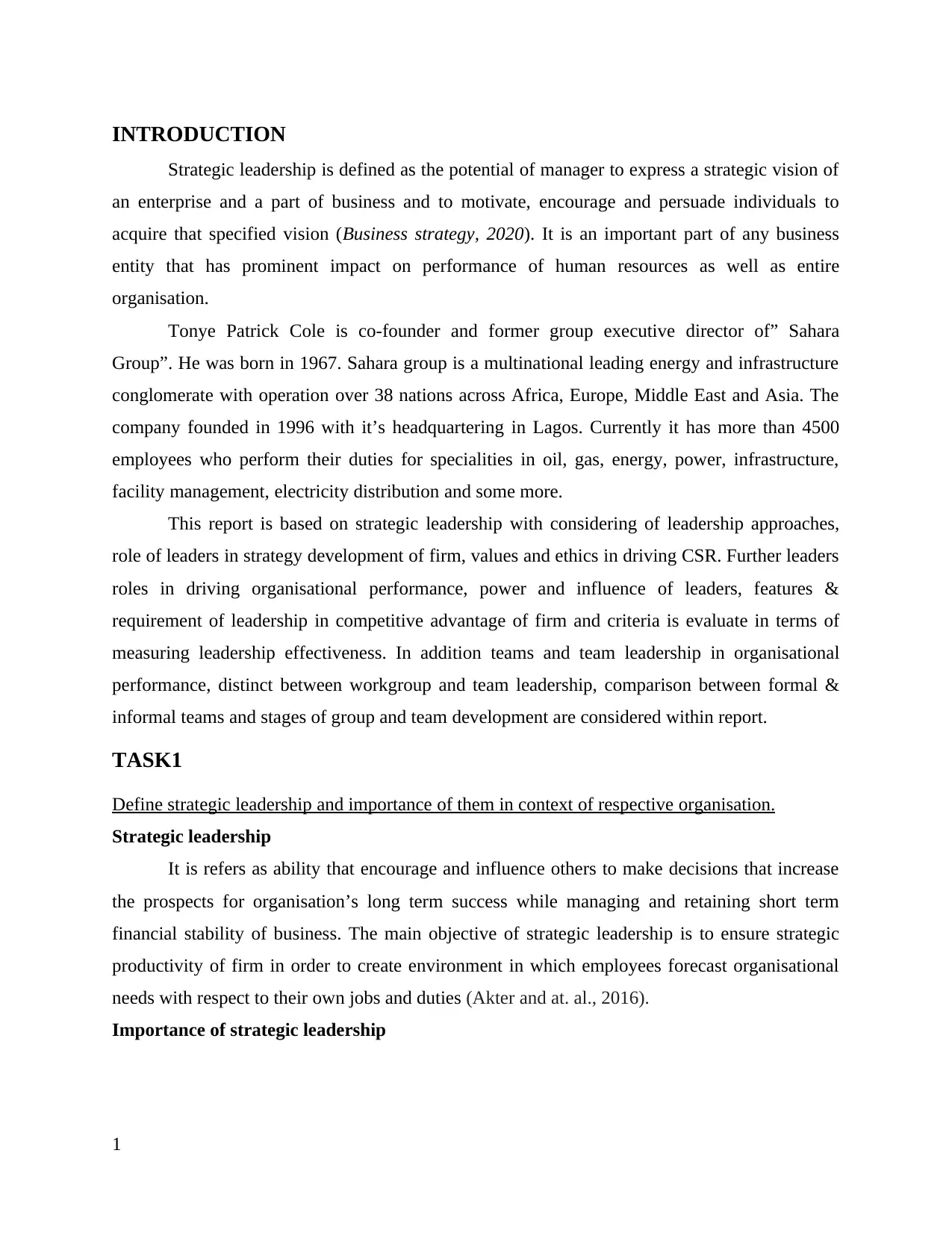
INTRODUCTION
Strategic leadership is defined as the potential of manager to express a strategic vision of
an enterprise and a part of business and to motivate, encourage and persuade individuals to
acquire that specified vision (Business strategy, 2020). It is an important part of any business
entity that has prominent impact on performance of human resources as well as entire
organisation.
Tonye Patrick Cole is co-founder and former group executive director of” Sahara
Group”. He was born in 1967. Sahara group is a multinational leading energy and infrastructure
conglomerate with operation over 38 nations across Africa, Europe, Middle East and Asia. The
company founded in 1996 with it’s headquartering in Lagos. Currently it has more than 4500
employees who perform their duties for specialities in oil, gas, energy, power, infrastructure,
facility management, electricity distribution and some more.
This report is based on strategic leadership with considering of leadership approaches,
role of leaders in strategy development of firm, values and ethics in driving CSR. Further leaders
roles in driving organisational performance, power and influence of leaders, features &
requirement of leadership in competitive advantage of firm and criteria is evaluate in terms of
measuring leadership effectiveness. In addition teams and team leadership in organisational
performance, distinct between workgroup and team leadership, comparison between formal &
informal teams and stages of group and team development are considered within report.
TASK1
Define strategic leadership and importance of them in context of respective organisation.
Strategic leadership
It is refers as ability that encourage and influence others to make decisions that increase
the prospects for organisation’s long term success while managing and retaining short term
financial stability of business. The main objective of strategic leadership is to ensure strategic
productivity of firm in order to create environment in which employees forecast organisational
needs with respect to their own jobs and duties (Akter and at. al., 2016).
Importance of strategic leadership
1
Strategic leadership is defined as the potential of manager to express a strategic vision of
an enterprise and a part of business and to motivate, encourage and persuade individuals to
acquire that specified vision (Business strategy, 2020). It is an important part of any business
entity that has prominent impact on performance of human resources as well as entire
organisation.
Tonye Patrick Cole is co-founder and former group executive director of” Sahara
Group”. He was born in 1967. Sahara group is a multinational leading energy and infrastructure
conglomerate with operation over 38 nations across Africa, Europe, Middle East and Asia. The
company founded in 1996 with it’s headquartering in Lagos. Currently it has more than 4500
employees who perform their duties for specialities in oil, gas, energy, power, infrastructure,
facility management, electricity distribution and some more.
This report is based on strategic leadership with considering of leadership approaches,
role of leaders in strategy development of firm, values and ethics in driving CSR. Further leaders
roles in driving organisational performance, power and influence of leaders, features &
requirement of leadership in competitive advantage of firm and criteria is evaluate in terms of
measuring leadership effectiveness. In addition teams and team leadership in organisational
performance, distinct between workgroup and team leadership, comparison between formal &
informal teams and stages of group and team development are considered within report.
TASK1
Define strategic leadership and importance of them in context of respective organisation.
Strategic leadership
It is refers as ability that encourage and influence others to make decisions that increase
the prospects for organisation’s long term success while managing and retaining short term
financial stability of business. The main objective of strategic leadership is to ensure strategic
productivity of firm in order to create environment in which employees forecast organisational
needs with respect to their own jobs and duties (Akter and at. al., 2016).
Importance of strategic leadership
1
Paraphrase This Document
Need a fresh take? Get an instant paraphrase of this document with our AI Paraphraser
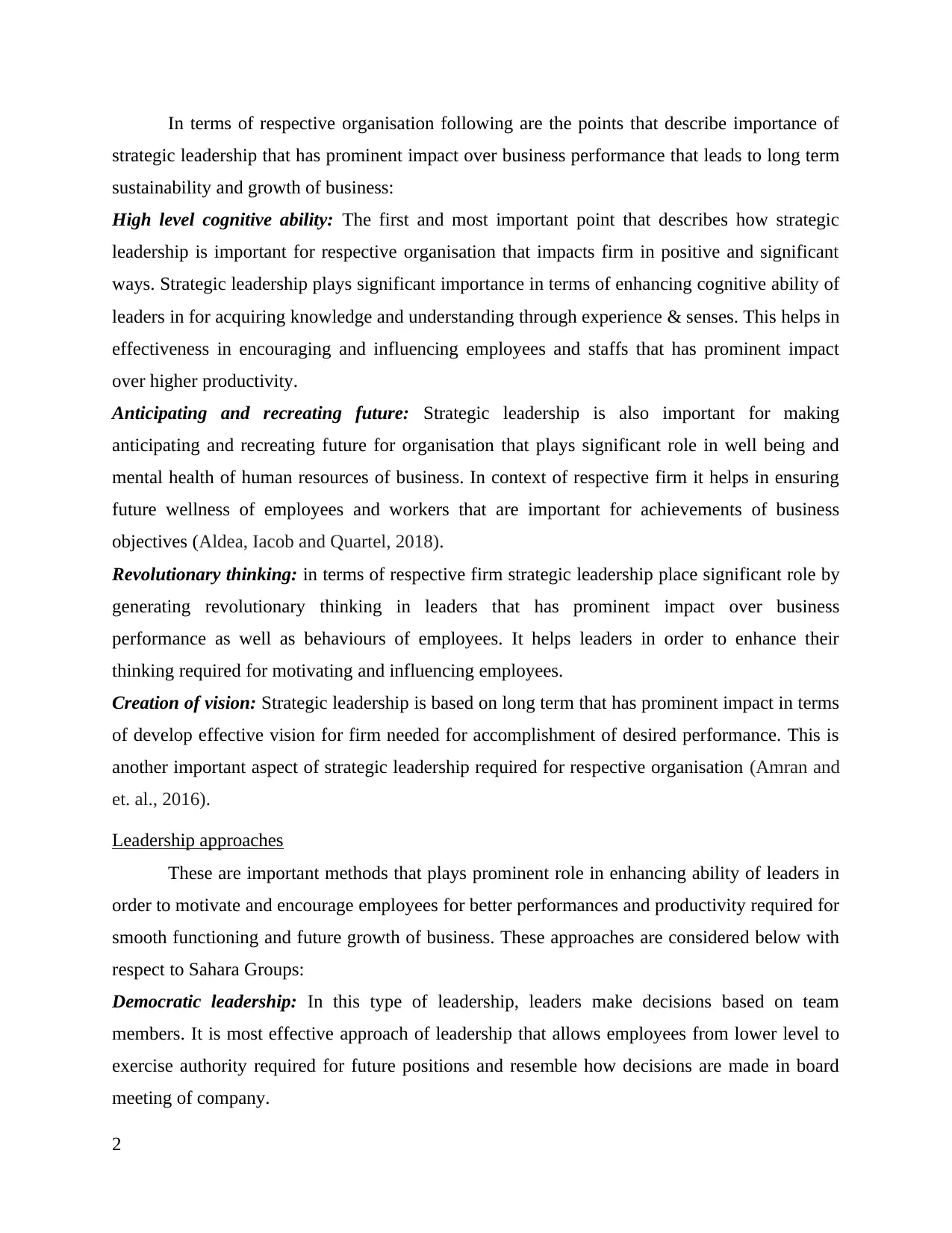
In terms of respective organisation following are the points that describe importance of
strategic leadership that has prominent impact over business performance that leads to long term
sustainability and growth of business:
High level cognitive ability: The first and most important point that describes how strategic
leadership is important for respective organisation that impacts firm in positive and significant
ways. Strategic leadership plays significant importance in terms of enhancing cognitive ability of
leaders in for acquiring knowledge and understanding through experience & senses. This helps in
effectiveness in encouraging and influencing employees and staffs that has prominent impact
over higher productivity.
Anticipating and recreating future: Strategic leadership is also important for making
anticipating and recreating future for organisation that plays significant role in well being and
mental health of human resources of business. In context of respective firm it helps in ensuring
future wellness of employees and workers that are important for achievements of business
objectives (Aldea, Iacob and Quartel, 2018).
Revolutionary thinking: in terms of respective firm strategic leadership place significant role by
generating revolutionary thinking in leaders that has prominent impact over business
performance as well as behaviours of employees. It helps leaders in order to enhance their
thinking required for motivating and influencing employees.
Creation of vision: Strategic leadership is based on long term that has prominent impact in terms
of develop effective vision for firm needed for accomplishment of desired performance. This is
another important aspect of strategic leadership required for respective organisation (Amran and
et. al., 2016).
Leadership approaches
These are important methods that plays prominent role in enhancing ability of leaders in
order to motivate and encourage employees for better performances and productivity required for
smooth functioning and future growth of business. These approaches are considered below with
respect to Sahara Groups:
Democratic leadership: In this type of leadership, leaders make decisions based on team
members. It is most effective approach of leadership that allows employees from lower level to
exercise authority required for future positions and resemble how decisions are made in board
meeting of company.
2
strategic leadership that has prominent impact over business performance that leads to long term
sustainability and growth of business:
High level cognitive ability: The first and most important point that describes how strategic
leadership is important for respective organisation that impacts firm in positive and significant
ways. Strategic leadership plays significant importance in terms of enhancing cognitive ability of
leaders in for acquiring knowledge and understanding through experience & senses. This helps in
effectiveness in encouraging and influencing employees and staffs that has prominent impact
over higher productivity.
Anticipating and recreating future: Strategic leadership is also important for making
anticipating and recreating future for organisation that plays significant role in well being and
mental health of human resources of business. In context of respective firm it helps in ensuring
future wellness of employees and workers that are important for achievements of business
objectives (Aldea, Iacob and Quartel, 2018).
Revolutionary thinking: in terms of respective firm strategic leadership place significant role by
generating revolutionary thinking in leaders that has prominent impact over business
performance as well as behaviours of employees. It helps leaders in order to enhance their
thinking required for motivating and influencing employees.
Creation of vision: Strategic leadership is based on long term that has prominent impact in terms
of develop effective vision for firm needed for accomplishment of desired performance. This is
another important aspect of strategic leadership required for respective organisation (Amran and
et. al., 2016).
Leadership approaches
These are important methods that plays prominent role in enhancing ability of leaders in
order to motivate and encourage employees for better performances and productivity required for
smooth functioning and future growth of business. These approaches are considered below with
respect to Sahara Groups:
Democratic leadership: In this type of leadership, leaders make decisions based on team
members. It is most effective approach of leadership that allows employees from lower level to
exercise authority required for future positions and resemble how decisions are made in board
meeting of company.
2
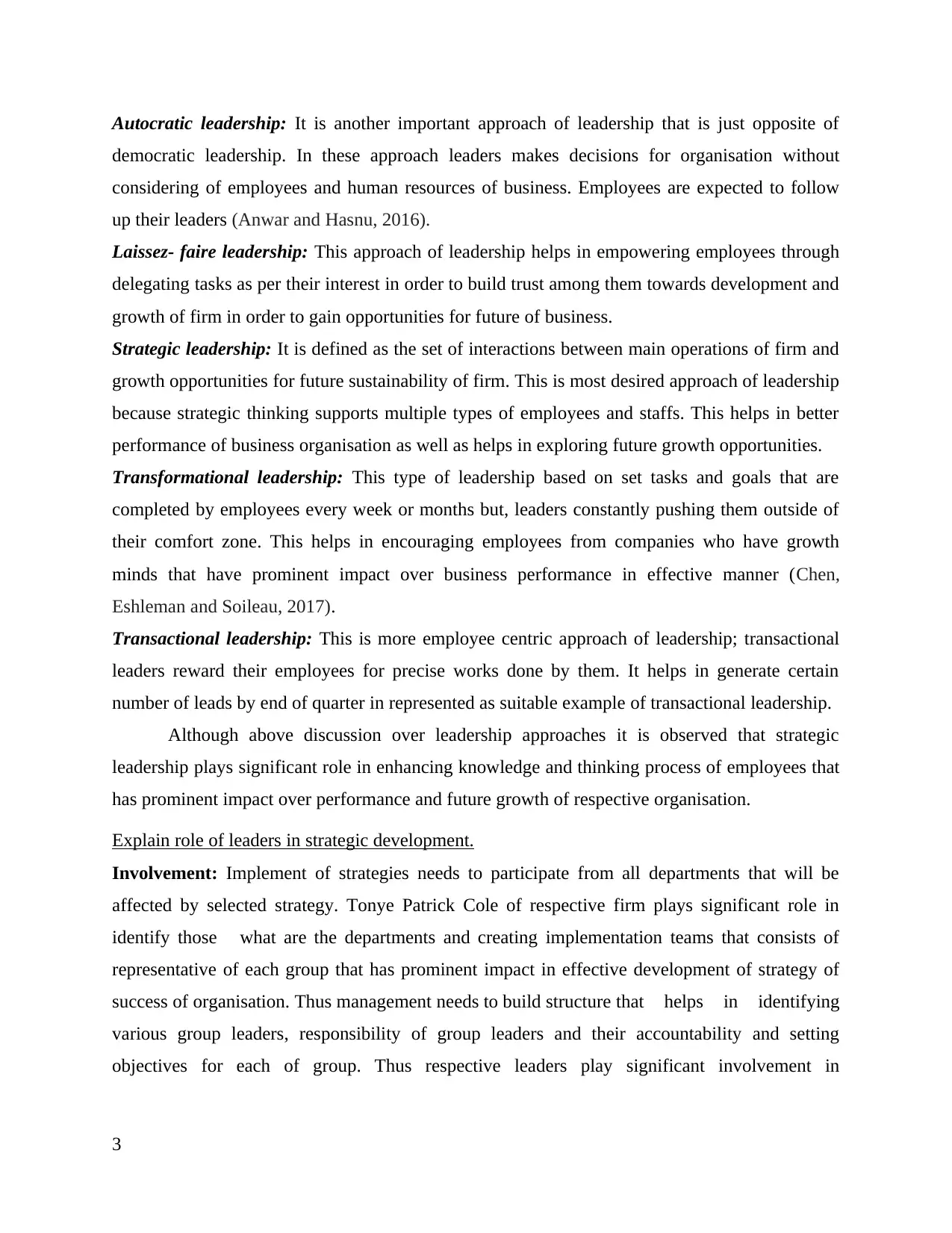
Autocratic leadership: It is another important approach of leadership that is just opposite of
democratic leadership. In these approach leaders makes decisions for organisation without
considering of employees and human resources of business. Employees are expected to follow
up their leaders (Anwar and Hasnu, 2016).
Laissez- faire leadership: This approach of leadership helps in empowering employees through
delegating tasks as per their interest in order to build trust among them towards development and
growth of firm in order to gain opportunities for future of business.
Strategic leadership: It is defined as the set of interactions between main operations of firm and
growth opportunities for future sustainability of firm. This is most desired approach of leadership
because strategic thinking supports multiple types of employees and staffs. This helps in better
performance of business organisation as well as helps in exploring future growth opportunities.
Transformational leadership: This type of leadership based on set tasks and goals that are
completed by employees every week or months but, leaders constantly pushing them outside of
their comfort zone. This helps in encouraging employees from companies who have growth
minds that have prominent impact over business performance in effective manner (Chen,
Eshleman and Soileau, 2017).
Transactional leadership: This is more employee centric approach of leadership; transactional
leaders reward their employees for precise works done by them. It helps in generate certain
number of leads by end of quarter in represented as suitable example of transactional leadership.
Although above discussion over leadership approaches it is observed that strategic
leadership plays significant role in enhancing knowledge and thinking process of employees that
has prominent impact over performance and future growth of respective organisation.
Explain role of leaders in strategic development.
Involvement: Implement of strategies needs to participate from all departments that will be
affected by selected strategy. Tonye Patrick Cole of respective firm plays significant role in
identify those what are the departments and creating implementation teams that consists of
representative of each group that has prominent impact in effective development of strategy of
success of organisation. Thus management needs to build structure that helps in identifying
various group leaders, responsibility of group leaders and their accountability and setting
objectives for each of group. Thus respective leaders play significant involvement in
3
democratic leadership. In these approach leaders makes decisions for organisation without
considering of employees and human resources of business. Employees are expected to follow
up their leaders (Anwar and Hasnu, 2016).
Laissez- faire leadership: This approach of leadership helps in empowering employees through
delegating tasks as per their interest in order to build trust among them towards development and
growth of firm in order to gain opportunities for future of business.
Strategic leadership: It is defined as the set of interactions between main operations of firm and
growth opportunities for future sustainability of firm. This is most desired approach of leadership
because strategic thinking supports multiple types of employees and staffs. This helps in better
performance of business organisation as well as helps in exploring future growth opportunities.
Transformational leadership: This type of leadership based on set tasks and goals that are
completed by employees every week or months but, leaders constantly pushing them outside of
their comfort zone. This helps in encouraging employees from companies who have growth
minds that have prominent impact over business performance in effective manner (Chen,
Eshleman and Soileau, 2017).
Transactional leadership: This is more employee centric approach of leadership; transactional
leaders reward their employees for precise works done by them. It helps in generate certain
number of leads by end of quarter in represented as suitable example of transactional leadership.
Although above discussion over leadership approaches it is observed that strategic
leadership plays significant role in enhancing knowledge and thinking process of employees that
has prominent impact over performance and future growth of respective organisation.
Explain role of leaders in strategic development.
Involvement: Implement of strategies needs to participate from all departments that will be
affected by selected strategy. Tonye Patrick Cole of respective firm plays significant role in
identify those what are the departments and creating implementation teams that consists of
representative of each group that has prominent impact in effective development of strategy of
success of organisation. Thus management needs to build structure that helps in identifying
various group leaders, responsibility of group leaders and their accountability and setting
objectives for each of group. Thus respective leaders play significant involvement in
3
⊘ This is a preview!⊘
Do you want full access?
Subscribe today to unlock all pages.

Trusted by 1+ million students worldwide
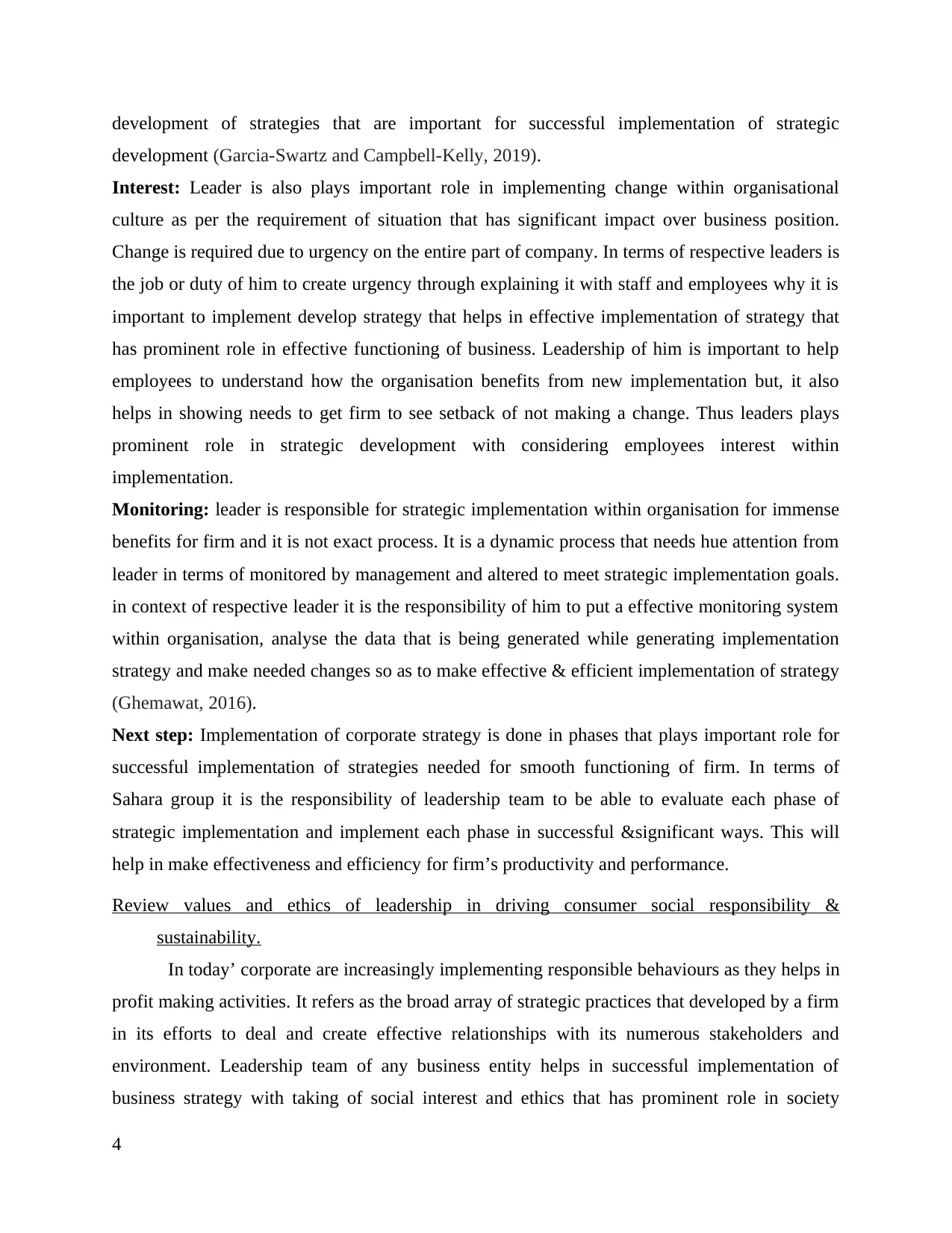
development of strategies that are important for successful implementation of strategic
development (Garcia-Swartz and Campbell-Kelly, 2019).
Interest: Leader is also plays important role in implementing change within organisational
culture as per the requirement of situation that has significant impact over business position.
Change is required due to urgency on the entire part of company. In terms of respective leaders is
the job or duty of him to create urgency through explaining it with staff and employees why it is
important to implement develop strategy that helps in effective implementation of strategy that
has prominent role in effective functioning of business. Leadership of him is important to help
employees to understand how the organisation benefits from new implementation but, it also
helps in showing needs to get firm to see setback of not making a change. Thus leaders plays
prominent role in strategic development with considering employees interest within
implementation.
Monitoring: leader is responsible for strategic implementation within organisation for immense
benefits for firm and it is not exact process. It is a dynamic process that needs hue attention from
leader in terms of monitored by management and altered to meet strategic implementation goals.
in context of respective leader it is the responsibility of him to put a effective monitoring system
within organisation, analyse the data that is being generated while generating implementation
strategy and make needed changes so as to make effective & efficient implementation of strategy
(Ghemawat, 2016).
Next step: Implementation of corporate strategy is done in phases that plays important role for
successful implementation of strategies needed for smooth functioning of firm. In terms of
Sahara group it is the responsibility of leadership team to be able to evaluate each phase of
strategic implementation and implement each phase in successful &significant ways. This will
help in make effectiveness and efficiency for firm’s productivity and performance.
Review values and ethics of leadership in driving consumer social responsibility &
sustainability.
In today’ corporate are increasingly implementing responsible behaviours as they helps in
profit making activities. It refers as the broad array of strategic practices that developed by a firm
in its efforts to deal and create effective relationships with its numerous stakeholders and
environment. Leadership team of any business entity helps in successful implementation of
business strategy with taking of social interest and ethics that has prominent role in society
4
development (Garcia-Swartz and Campbell-Kelly, 2019).
Interest: Leader is also plays important role in implementing change within organisational
culture as per the requirement of situation that has significant impact over business position.
Change is required due to urgency on the entire part of company. In terms of respective leaders is
the job or duty of him to create urgency through explaining it with staff and employees why it is
important to implement develop strategy that helps in effective implementation of strategy that
has prominent role in effective functioning of business. Leadership of him is important to help
employees to understand how the organisation benefits from new implementation but, it also
helps in showing needs to get firm to see setback of not making a change. Thus leaders plays
prominent role in strategic development with considering employees interest within
implementation.
Monitoring: leader is responsible for strategic implementation within organisation for immense
benefits for firm and it is not exact process. It is a dynamic process that needs hue attention from
leader in terms of monitored by management and altered to meet strategic implementation goals.
in context of respective leader it is the responsibility of him to put a effective monitoring system
within organisation, analyse the data that is being generated while generating implementation
strategy and make needed changes so as to make effective & efficient implementation of strategy
(Ghemawat, 2016).
Next step: Implementation of corporate strategy is done in phases that plays important role for
successful implementation of strategies needed for smooth functioning of firm. In terms of
Sahara group it is the responsibility of leadership team to be able to evaluate each phase of
strategic implementation and implement each phase in successful &significant ways. This will
help in make effectiveness and efficiency for firm’s productivity and performance.
Review values and ethics of leadership in driving consumer social responsibility &
sustainability.
In today’ corporate are increasingly implementing responsible behaviours as they helps in
profit making activities. It refers as the broad array of strategic practices that developed by a firm
in its efforts to deal and create effective relationships with its numerous stakeholders and
environment. Leadership team of any business entity helps in successful implementation of
business strategy with taking of social interest and ethics that has prominent role in society
4
Paraphrase This Document
Need a fresh take? Get an instant paraphrase of this document with our AI Paraphraser
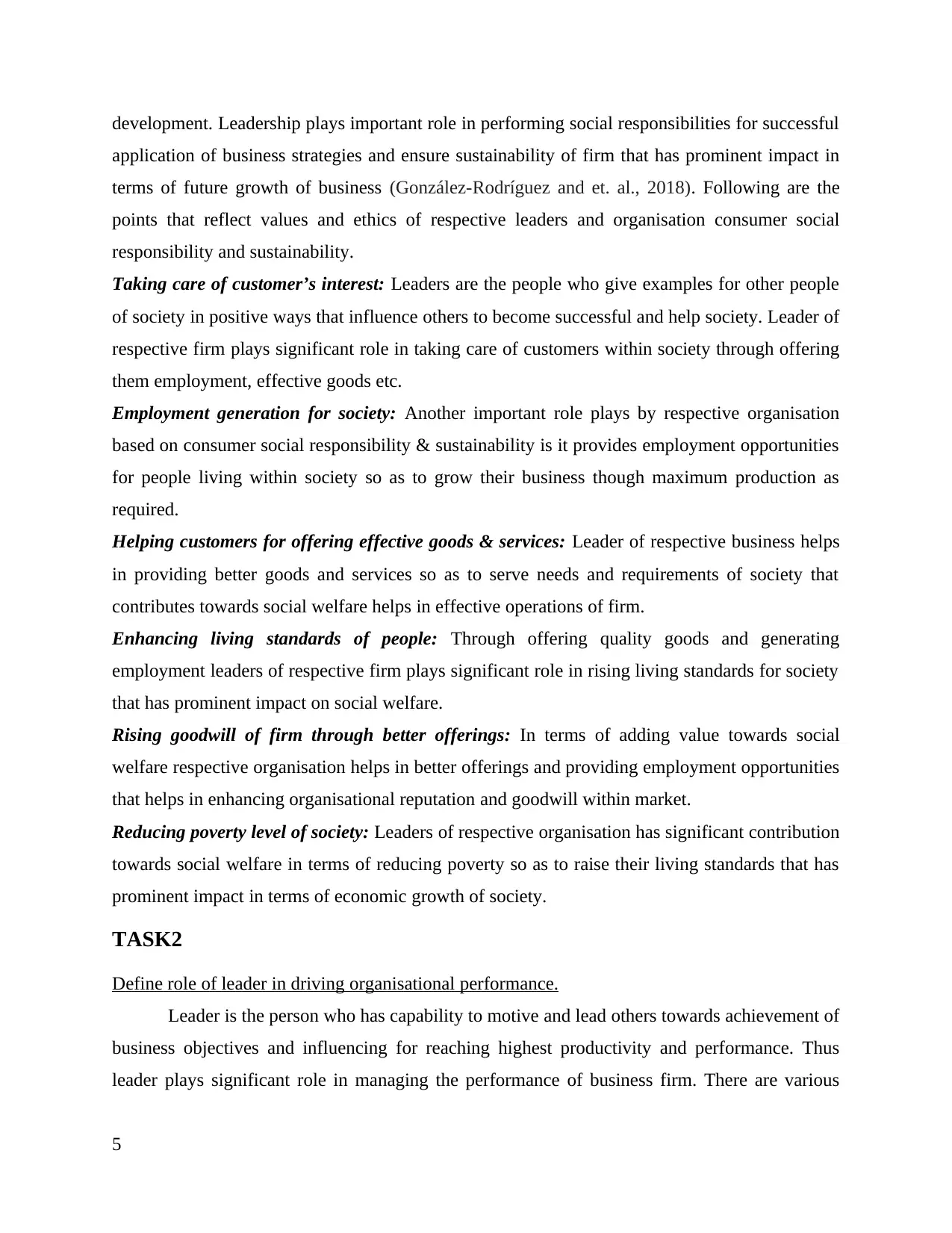
development. Leadership plays important role in performing social responsibilities for successful
application of business strategies and ensure sustainability of firm that has prominent impact in
terms of future growth of business (González-Rodríguez and et. al., 2018). Following are the
points that reflect values and ethics of respective leaders and organisation consumer social
responsibility and sustainability.
Taking care of customer’s interest: Leaders are the people who give examples for other people
of society in positive ways that influence others to become successful and help society. Leader of
respective firm plays significant role in taking care of customers within society through offering
them employment, effective goods etc.
Employment generation for society: Another important role plays by respective organisation
based on consumer social responsibility & sustainability is it provides employment opportunities
for people living within society so as to grow their business though maximum production as
required.
Helping customers for offering effective goods & services: Leader of respective business helps
in providing better goods and services so as to serve needs and requirements of society that
contributes towards social welfare helps in effective operations of firm.
Enhancing living standards of people: Through offering quality goods and generating
employment leaders of respective firm plays significant role in rising living standards for society
that has prominent impact on social welfare.
Rising goodwill of firm through better offerings: In terms of adding value towards social
welfare respective organisation helps in better offerings and providing employment opportunities
that helps in enhancing organisational reputation and goodwill within market.
Reducing poverty level of society: Leaders of respective organisation has significant contribution
towards social welfare in terms of reducing poverty so as to raise their living standards that has
prominent impact in terms of economic growth of society.
TASK2
Define role of leader in driving organisational performance.
Leader is the person who has capability to motive and lead others towards achievement of
business objectives and influencing for reaching highest productivity and performance. Thus
leader plays significant role in managing the performance of business firm. There are various
5
application of business strategies and ensure sustainability of firm that has prominent impact in
terms of future growth of business (González-Rodríguez and et. al., 2018). Following are the
points that reflect values and ethics of respective leaders and organisation consumer social
responsibility and sustainability.
Taking care of customer’s interest: Leaders are the people who give examples for other people
of society in positive ways that influence others to become successful and help society. Leader of
respective firm plays significant role in taking care of customers within society through offering
them employment, effective goods etc.
Employment generation for society: Another important role plays by respective organisation
based on consumer social responsibility & sustainability is it provides employment opportunities
for people living within society so as to grow their business though maximum production as
required.
Helping customers for offering effective goods & services: Leader of respective business helps
in providing better goods and services so as to serve needs and requirements of society that
contributes towards social welfare helps in effective operations of firm.
Enhancing living standards of people: Through offering quality goods and generating
employment leaders of respective firm plays significant role in rising living standards for society
that has prominent impact on social welfare.
Rising goodwill of firm through better offerings: In terms of adding value towards social
welfare respective organisation helps in better offerings and providing employment opportunities
that helps in enhancing organisational reputation and goodwill within market.
Reducing poverty level of society: Leaders of respective organisation has significant contribution
towards social welfare in terms of reducing poverty so as to raise their living standards that has
prominent impact in terms of economic growth of society.
TASK2
Define role of leader in driving organisational performance.
Leader is the person who has capability to motive and lead others towards achievement of
business objectives and influencing for reaching highest productivity and performance. Thus
leader plays significant role in managing the performance of business firm. There are various
5
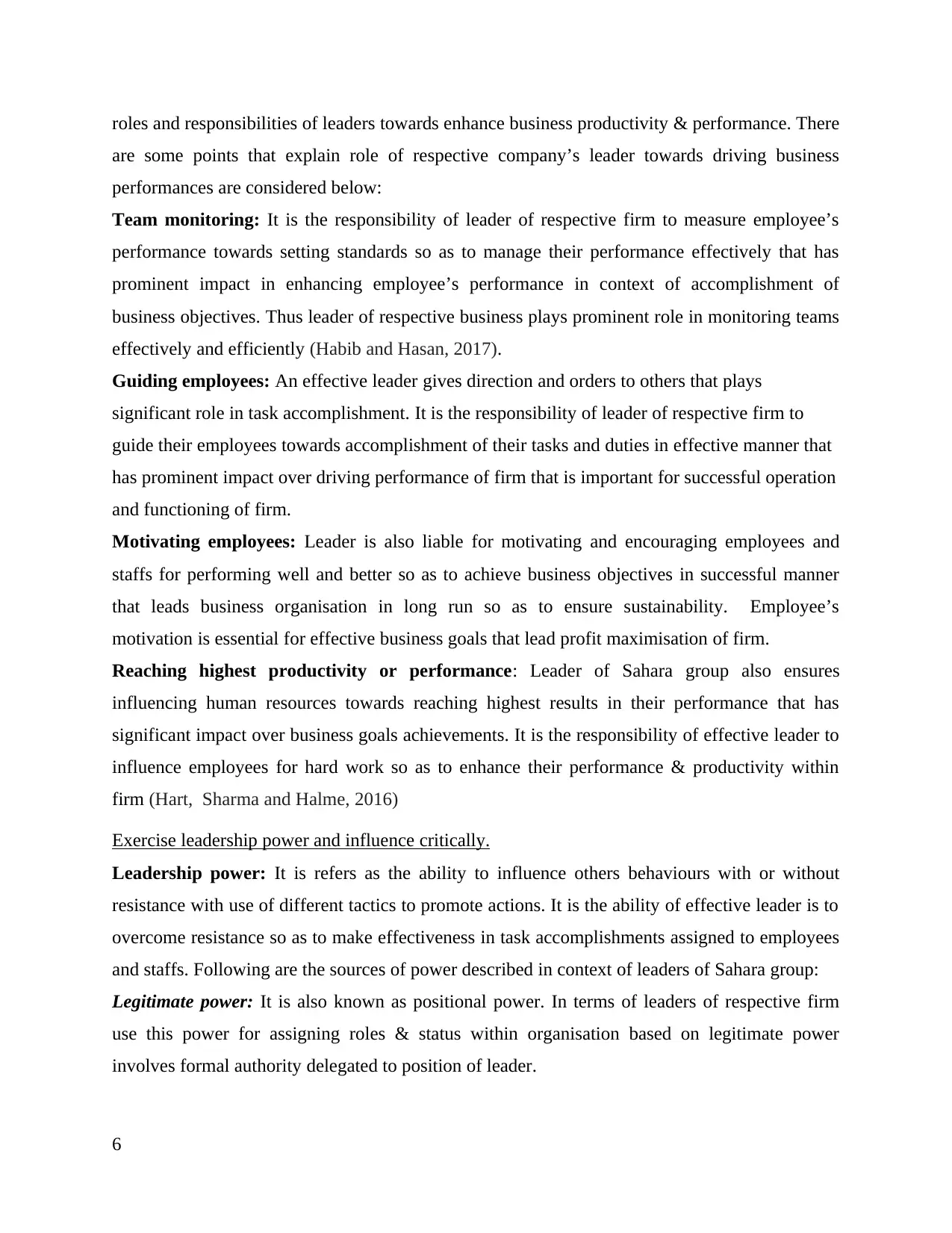
roles and responsibilities of leaders towards enhance business productivity & performance. There
are some points that explain role of respective company’s leader towards driving business
performances are considered below:
Team monitoring: It is the responsibility of leader of respective firm to measure employee’s
performance towards setting standards so as to manage their performance effectively that has
prominent impact in enhancing employee’s performance in context of accomplishment of
business objectives. Thus leader of respective business plays prominent role in monitoring teams
effectively and efficiently (Habib and Hasan, 2017).
Guiding employees: An effective leader gives direction and orders to others that plays
significant role in task accomplishment. It is the responsibility of leader of respective firm to
guide their employees towards accomplishment of their tasks and duties in effective manner that
has prominent impact over driving performance of firm that is important for successful operation
and functioning of firm.
Motivating employees: Leader is also liable for motivating and encouraging employees and
staffs for performing well and better so as to achieve business objectives in successful manner
that leads business organisation in long run so as to ensure sustainability. Employee’s
motivation is essential for effective business goals that lead profit maximisation of firm.
Reaching highest productivity or performance: Leader of Sahara group also ensures
influencing human resources towards reaching highest results in their performance that has
significant impact over business goals achievements. It is the responsibility of effective leader to
influence employees for hard work so as to enhance their performance & productivity within
firm (Hart, Sharma and Halme, 2016)
Exercise leadership power and influence critically.
Leadership power: It is refers as the ability to influence others behaviours with or without
resistance with use of different tactics to promote actions. It is the ability of effective leader is to
overcome resistance so as to make effectiveness in task accomplishments assigned to employees
and staffs. Following are the sources of power described in context of leaders of Sahara group:
Legitimate power: It is also known as positional power. In terms of leaders of respective firm
use this power for assigning roles & status within organisation based on legitimate power
involves formal authority delegated to position of leader.
6
are some points that explain role of respective company’s leader towards driving business
performances are considered below:
Team monitoring: It is the responsibility of leader of respective firm to measure employee’s
performance towards setting standards so as to manage their performance effectively that has
prominent impact in enhancing employee’s performance in context of accomplishment of
business objectives. Thus leader of respective business plays prominent role in monitoring teams
effectively and efficiently (Habib and Hasan, 2017).
Guiding employees: An effective leader gives direction and orders to others that plays
significant role in task accomplishment. It is the responsibility of leader of respective firm to
guide their employees towards accomplishment of their tasks and duties in effective manner that
has prominent impact over driving performance of firm that is important for successful operation
and functioning of firm.
Motivating employees: Leader is also liable for motivating and encouraging employees and
staffs for performing well and better so as to achieve business objectives in successful manner
that leads business organisation in long run so as to ensure sustainability. Employee’s
motivation is essential for effective business goals that lead profit maximisation of firm.
Reaching highest productivity or performance: Leader of Sahara group also ensures
influencing human resources towards reaching highest results in their performance that has
significant impact over business goals achievements. It is the responsibility of effective leader to
influence employees for hard work so as to enhance their performance & productivity within
firm (Hart, Sharma and Halme, 2016)
Exercise leadership power and influence critically.
Leadership power: It is refers as the ability to influence others behaviours with or without
resistance with use of different tactics to promote actions. It is the ability of effective leader is to
overcome resistance so as to make effectiveness in task accomplishments assigned to employees
and staffs. Following are the sources of power described in context of leaders of Sahara group:
Legitimate power: It is also known as positional power. In terms of leaders of respective firm
use this power for assigning roles & status within organisation based on legitimate power
involves formal authority delegated to position of leader.
6
⊘ This is a preview!⊘
Do you want full access?
Subscribe today to unlock all pages.

Trusted by 1+ million students worldwide
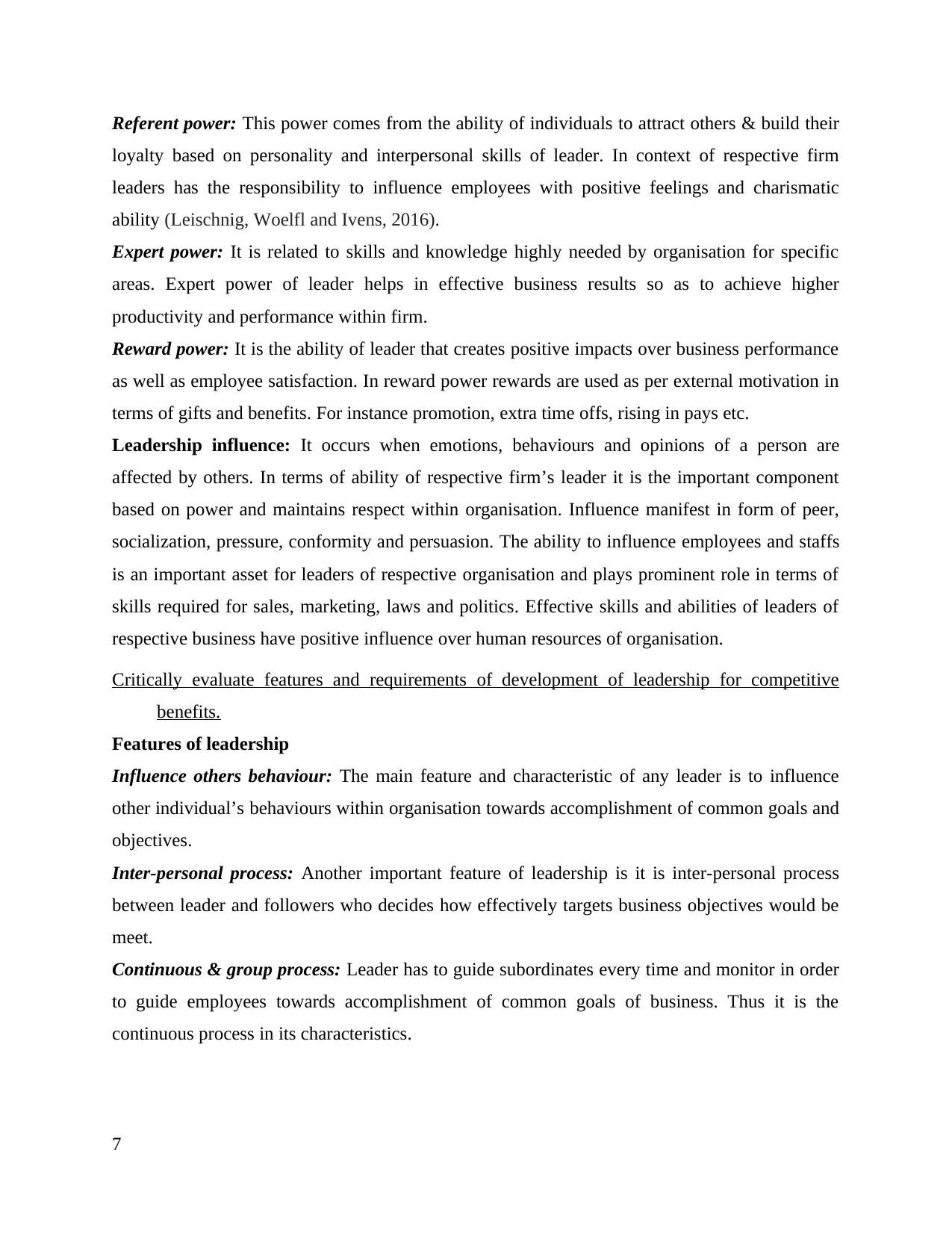
Referent power: This power comes from the ability of individuals to attract others & build their
loyalty based on personality and interpersonal skills of leader. In context of respective firm
leaders has the responsibility to influence employees with positive feelings and charismatic
ability (Leischnig, Woelfl and Ivens, 2016).
Expert power: It is related to skills and knowledge highly needed by organisation for specific
areas. Expert power of leader helps in effective business results so as to achieve higher
productivity and performance within firm.
Reward power: It is the ability of leader that creates positive impacts over business performance
as well as employee satisfaction. In reward power rewards are used as per external motivation in
terms of gifts and benefits. For instance promotion, extra time offs, rising in pays etc.
Leadership influence: It occurs when emotions, behaviours and opinions of a person are
affected by others. In terms of ability of respective firm’s leader it is the important component
based on power and maintains respect within organisation. Influence manifest in form of peer,
socialization, pressure, conformity and persuasion. The ability to influence employees and staffs
is an important asset for leaders of respective organisation and plays prominent role in terms of
skills required for sales, marketing, laws and politics. Effective skills and abilities of leaders of
respective business have positive influence over human resources of organisation.
Critically evaluate features and requirements of development of leadership for competitive
benefits.
Features of leadership
Influence others behaviour: The main feature and characteristic of any leader is to influence
other individual’s behaviours within organisation towards accomplishment of common goals and
objectives.
Inter-personal process: Another important feature of leadership is it is inter-personal process
between leader and followers who decides how effectively targets business objectives would be
meet.
Continuous & group process: Leader has to guide subordinates every time and monitor in order
to guide employees towards accomplishment of common goals of business. Thus it is the
continuous process in its characteristics.
7
loyalty based on personality and interpersonal skills of leader. In context of respective firm
leaders has the responsibility to influence employees with positive feelings and charismatic
ability (Leischnig, Woelfl and Ivens, 2016).
Expert power: It is related to skills and knowledge highly needed by organisation for specific
areas. Expert power of leader helps in effective business results so as to achieve higher
productivity and performance within firm.
Reward power: It is the ability of leader that creates positive impacts over business performance
as well as employee satisfaction. In reward power rewards are used as per external motivation in
terms of gifts and benefits. For instance promotion, extra time offs, rising in pays etc.
Leadership influence: It occurs when emotions, behaviours and opinions of a person are
affected by others. In terms of ability of respective firm’s leader it is the important component
based on power and maintains respect within organisation. Influence manifest in form of peer,
socialization, pressure, conformity and persuasion. The ability to influence employees and staffs
is an important asset for leaders of respective organisation and plays prominent role in terms of
skills required for sales, marketing, laws and politics. Effective skills and abilities of leaders of
respective business have positive influence over human resources of organisation.
Critically evaluate features and requirements of development of leadership for competitive
benefits.
Features of leadership
Influence others behaviour: The main feature and characteristic of any leader is to influence
other individual’s behaviours within organisation towards accomplishment of common goals and
objectives.
Inter-personal process: Another important feature of leadership is it is inter-personal process
between leader and followers who decides how effectively targets business objectives would be
meet.
Continuous & group process: Leader has to guide subordinates every time and monitor in order
to guide employees towards accomplishment of common goals of business. Thus it is the
continuous process in its characteristics.
7
Paraphrase This Document
Need a fresh take? Get an instant paraphrase of this document with our AI Paraphraser
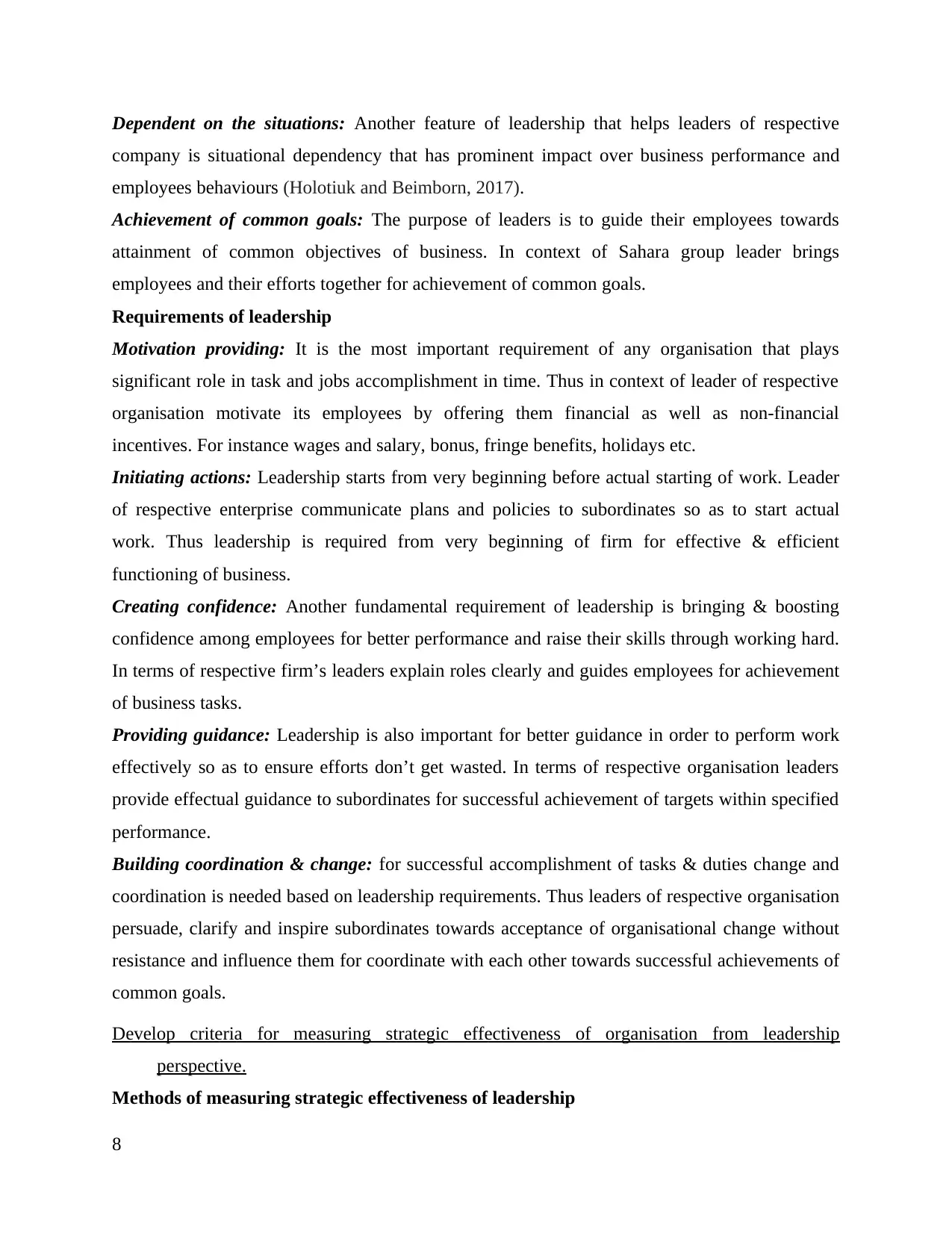
Dependent on the situations: Another feature of leadership that helps leaders of respective
company is situational dependency that has prominent impact over business performance and
employees behaviours (Holotiuk and Beimborn, 2017).
Achievement of common goals: The purpose of leaders is to guide their employees towards
attainment of common objectives of business. In context of Sahara group leader brings
employees and their efforts together for achievement of common goals.
Requirements of leadership
Motivation providing: It is the most important requirement of any organisation that plays
significant role in task and jobs accomplishment in time. Thus in context of leader of respective
organisation motivate its employees by offering them financial as well as non-financial
incentives. For instance wages and salary, bonus, fringe benefits, holidays etc.
Initiating actions: Leadership starts from very beginning before actual starting of work. Leader
of respective enterprise communicate plans and policies to subordinates so as to start actual
work. Thus leadership is required from very beginning of firm for effective & efficient
functioning of business.
Creating confidence: Another fundamental requirement of leadership is bringing & boosting
confidence among employees for better performance and raise their skills through working hard.
In terms of respective firm’s leaders explain roles clearly and guides employees for achievement
of business tasks.
Providing guidance: Leadership is also important for better guidance in order to perform work
effectively so as to ensure efforts don’t get wasted. In terms of respective organisation leaders
provide effectual guidance to subordinates for successful achievement of targets within specified
performance.
Building coordination & change: for successful accomplishment of tasks & duties change and
coordination is needed based on leadership requirements. Thus leaders of respective organisation
persuade, clarify and inspire subordinates towards acceptance of organisational change without
resistance and influence them for coordinate with each other towards successful achievements of
common goals.
Develop criteria for measuring strategic effectiveness of organisation from leadership
perspective.
Methods of measuring strategic effectiveness of leadership
8
company is situational dependency that has prominent impact over business performance and
employees behaviours (Holotiuk and Beimborn, 2017).
Achievement of common goals: The purpose of leaders is to guide their employees towards
attainment of common objectives of business. In context of Sahara group leader brings
employees and their efforts together for achievement of common goals.
Requirements of leadership
Motivation providing: It is the most important requirement of any organisation that plays
significant role in task and jobs accomplishment in time. Thus in context of leader of respective
organisation motivate its employees by offering them financial as well as non-financial
incentives. For instance wages and salary, bonus, fringe benefits, holidays etc.
Initiating actions: Leadership starts from very beginning before actual starting of work. Leader
of respective enterprise communicate plans and policies to subordinates so as to start actual
work. Thus leadership is required from very beginning of firm for effective & efficient
functioning of business.
Creating confidence: Another fundamental requirement of leadership is bringing & boosting
confidence among employees for better performance and raise their skills through working hard.
In terms of respective firm’s leaders explain roles clearly and guides employees for achievement
of business tasks.
Providing guidance: Leadership is also important for better guidance in order to perform work
effectively so as to ensure efforts don’t get wasted. In terms of respective organisation leaders
provide effectual guidance to subordinates for successful achievement of targets within specified
performance.
Building coordination & change: for successful accomplishment of tasks & duties change and
coordination is needed based on leadership requirements. Thus leaders of respective organisation
persuade, clarify and inspire subordinates towards acceptance of organisational change without
resistance and influence them for coordinate with each other towards successful achievements of
common goals.
Develop criteria for measuring strategic effectiveness of organisation from leadership
perspective.
Methods of measuring strategic effectiveness of leadership
8
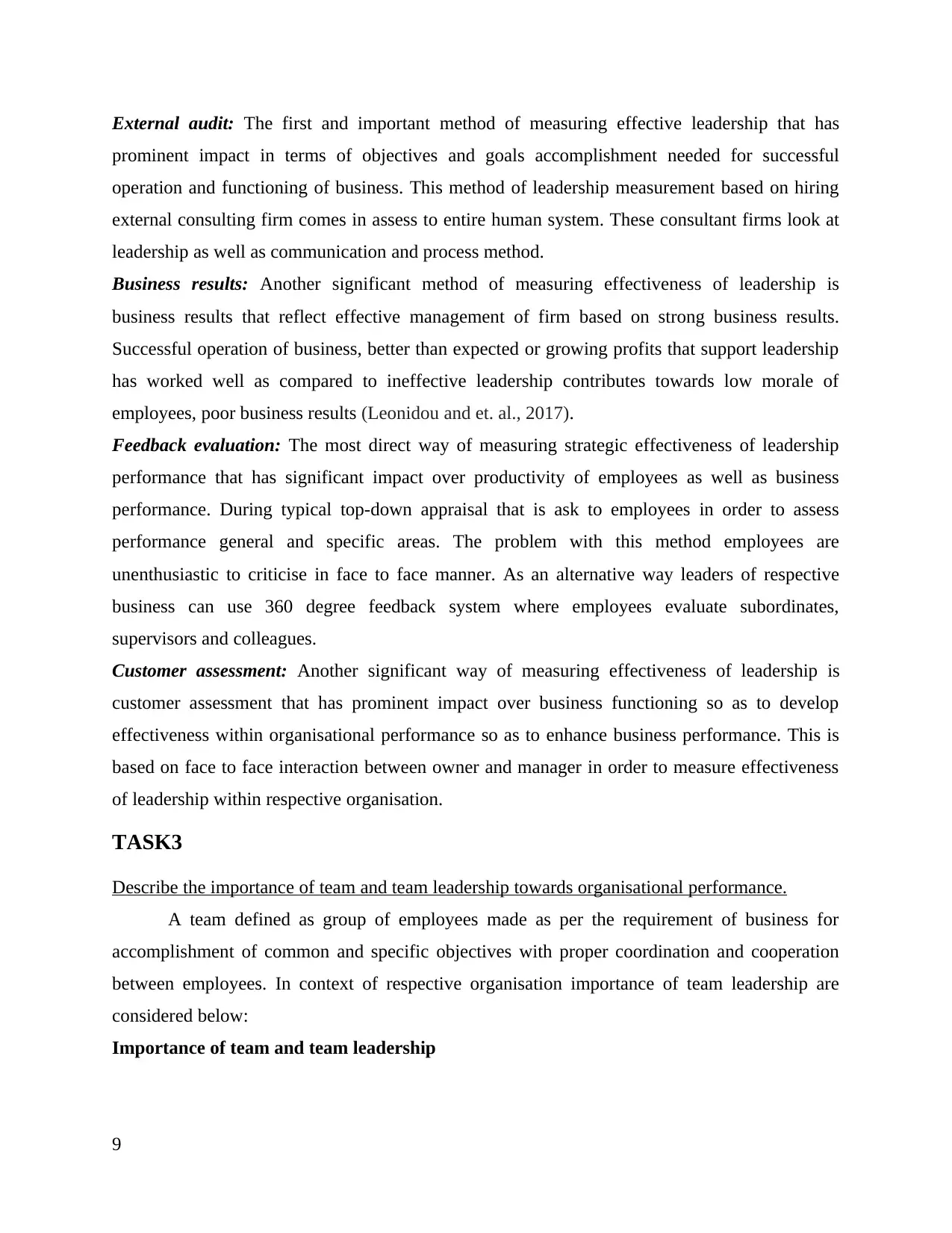
External audit: The first and important method of measuring effective leadership that has
prominent impact in terms of objectives and goals accomplishment needed for successful
operation and functioning of business. This method of leadership measurement based on hiring
external consulting firm comes in assess to entire human system. These consultant firms look at
leadership as well as communication and process method.
Business results: Another significant method of measuring effectiveness of leadership is
business results that reflect effective management of firm based on strong business results.
Successful operation of business, better than expected or growing profits that support leadership
has worked well as compared to ineffective leadership contributes towards low morale of
employees, poor business results (Leonidou and et. al., 2017).
Feedback evaluation: The most direct way of measuring strategic effectiveness of leadership
performance that has significant impact over productivity of employees as well as business
performance. During typical top-down appraisal that is ask to employees in order to assess
performance general and specific areas. The problem with this method employees are
unenthusiastic to criticise in face to face manner. As an alternative way leaders of respective
business can use 360 degree feedback system where employees evaluate subordinates,
supervisors and colleagues.
Customer assessment: Another significant way of measuring effectiveness of leadership is
customer assessment that has prominent impact over business functioning so as to develop
effectiveness within organisational performance so as to enhance business performance. This is
based on face to face interaction between owner and manager in order to measure effectiveness
of leadership within respective organisation.
TASK3
Describe the importance of team and team leadership towards organisational performance.
A team defined as group of employees made as per the requirement of business for
accomplishment of common and specific objectives with proper coordination and cooperation
between employees. In context of respective organisation importance of team leadership are
considered below:
Importance of team and team leadership
9
prominent impact in terms of objectives and goals accomplishment needed for successful
operation and functioning of business. This method of leadership measurement based on hiring
external consulting firm comes in assess to entire human system. These consultant firms look at
leadership as well as communication and process method.
Business results: Another significant method of measuring effectiveness of leadership is
business results that reflect effective management of firm based on strong business results.
Successful operation of business, better than expected or growing profits that support leadership
has worked well as compared to ineffective leadership contributes towards low morale of
employees, poor business results (Leonidou and et. al., 2017).
Feedback evaluation: The most direct way of measuring strategic effectiveness of leadership
performance that has significant impact over productivity of employees as well as business
performance. During typical top-down appraisal that is ask to employees in order to assess
performance general and specific areas. The problem with this method employees are
unenthusiastic to criticise in face to face manner. As an alternative way leaders of respective
business can use 360 degree feedback system where employees evaluate subordinates,
supervisors and colleagues.
Customer assessment: Another significant way of measuring effectiveness of leadership is
customer assessment that has prominent impact over business functioning so as to develop
effectiveness within organisational performance so as to enhance business performance. This is
based on face to face interaction between owner and manager in order to measure effectiveness
of leadership within respective organisation.
TASK3
Describe the importance of team and team leadership towards organisational performance.
A team defined as group of employees made as per the requirement of business for
accomplishment of common and specific objectives with proper coordination and cooperation
between employees. In context of respective organisation importance of team leadership are
considered below:
Importance of team and team leadership
9
⊘ This is a preview!⊘
Do you want full access?
Subscribe today to unlock all pages.

Trusted by 1+ million students worldwide
1 out of 18
Related Documents
Your All-in-One AI-Powered Toolkit for Academic Success.
+13062052269
info@desklib.com
Available 24*7 on WhatsApp / Email
![[object Object]](/_next/static/media/star-bottom.7253800d.svg)
Unlock your academic potential
Copyright © 2020–2025 A2Z Services. All Rights Reserved. Developed and managed by ZUCOL.





